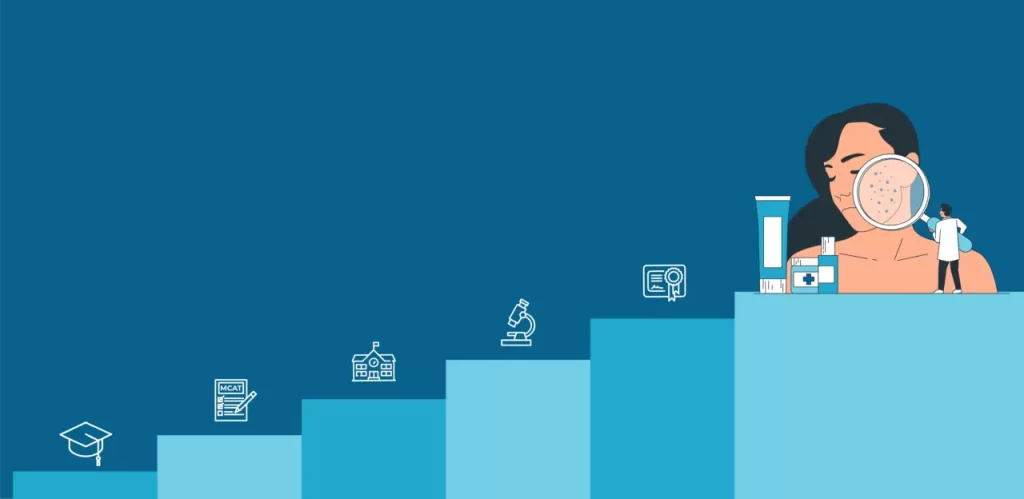The hard skills of a dermatologist are the medical and technical abilities needed to find and treat skin problems. Dermatologists perform biopsies, use dermatoscopes, and carry out Mohs surgery to remove cancer safely.
These skills help ensure quick and correct diagnoses, safe care, and better results for patients. They also use digital tools to track treatments and improve efficiency. Together, these skills meet the dermatologist’s job requirements and build a trusted career in dermatology.
DermOnDemand, led by Dr. Hannah Kopelman, connects patients with board-certified dermatologists across the United States for expert care. Dermatology is not only about skin health – it also requires medical knowledge, technical skill, and years of training.
Understanding these skills shows how dermatologists diagnose and treat skin conditions with precision and care.
Key Takeaways
- Dermatologists rely on advanced medical and technical abilities – such as dermatoscopy, biopsies, and Mohs surgery – to accurately diagnose and treat skin conditions.
- Meeting dermatologist job requirements involves completing an accredited medical school, a dermatology residency, and earning board-certified status through the American Board of Dermatology.
- Strong analytical thinking, attention to detail, and empathy are as essential as clinical expertise for ensuring safe, effective, and compassionate patient care.
- Continuous education through institutions like the American Academy of Dermatology keeps professionals updated on new treatments and technologies that affect the skin.
- Platforms like DermOnDemand, led by Dr. Hannah Kopelman, make expert dermatologic care accessible across the United States, combining trusted medical skill with modern digital tools.
Core Skills Every Dermatologist Needs
Clinical and Diagnostic Expertise
Dermatologists learn to diagnose and treat diseases affecting the skin, hair, nails, and mucous membranes. They detect infections, allergies, and skin cancers early.
Their background in internal medicine helps them see when skin symptoms relate to other health problems. Each diagnosis includes looking closely, asking questions, and ordering tests if needed.
Dermatoscopy and Skin Imaging
Dermatoscopy and digital imaging are key diagnostic tools in dermatology. These methods let doctors examine the deeper layers of the skin, helping them detect skin cancers like melanoma before they become dangerous.
High-quality images make it easier to compare changes over time and spot irregular growths. By combining these tools with clinical exams, dermatologists improve accuracy, speed, and overall patient care.
Biopsy, Histopathology, and Laser Procedures
Biopsies and histopathology are vital for confirming a diagnosis when a skin condition is unclear. A dermatologist removes a small tissue sample and studies it under a microscope to identify infections, skin cancers, or inflammatory diseases.
Lasers are also used to treat scars, pigmentation, and benign lesions with minimal pain and recovery time. These procedures are central to the hard skills of a dermatologist and highlight the precision and safety expected from a board-certified professional.
Pharmacology and Prescription Accuracy
Dermatologists must understand how different medicines affect the skin and the body as a whole. They use this knowledge to prescribe the right treatments, including topical creams, oral medications, or advanced biologic therapies for chronic diseases like eczema or psoriasis.
Correct dosage and drug combinations prevent side effects and promote better results. At DermOnDemand, every treatment plan is carefully reviewed by a board-certified dermatologist to ensure it meets the highest standards of safety and effectiveness.
Technical and Digital Dermatology Skills
Modern dermatologists use online tools and imaging systems to treat patients remotely. They manage electronic records and sometimes use AI for faster diagnosis. These technical skills make a career in dermatology more effective and accessible.
Education and Career Requirements

Education Needed to Be a Dermatologist
To start, students must complete an accredited medical school and earn a Doctor of Medicine (MD) degree. Courses include anatomy, pharmacology, and pathology to learn how diseases affect the skin and body.
How to Become a Dermatologist After 12th
After high school, students take science classes in college before applying to medical school. They must study for years, take exams, and complete hands-on training. Reaching the dermatologist job requirements often takes more than ten years.
Timeline and Certification Process
After earning an MD, doctors complete an internal medicine internship and a dermatology residency, which usually lasts about three years. They must pass the American Board of Dermatology exam to be recognized in the United States. They also need a state’s medical licensing approval before starting to practice.
Continuing Education and Professional Development
Learning never stops in medicine. Dermatologists continue training through the American Academy of Dermatology. They study new treatments like biologic therapy and advanced Mohs surgery for skin cancers. Ongoing education keeps them skilled and board-certified.
Key Qualities of a Successful Dermatologist
Analytical Thinking and Attention to Detail
Dermatologists rely on sharp observation to identify even the smallest changes in color, shape, or texture of the skin. These details often reveal early signs of conditions like infections or skin cancers.
Accurate diagnosis depends on a methodical approach that combines visual analysis, patient history, and medical testing. This analytical mindset and attention to detail ensure safe, effective, and personalized patient care.
Empathy, Communication, and Patient Trust
Successful dermatologists build strong relationships through empathy and clear communication. They take time to listen, explain each step of the treatment, and address patient concerns with respect.
This is especially important in pediatric dermatology, where young patients and families need reassurance and patience. Empathy not only helps patients feel understood but also improves adherence to care plans and long-term outcomes.
Professional Integrity and Adaptability
Integrity and adaptability are essential qualities for every dermatologist. Upholding ethical standards and staying transparent about diagnoses and treatments builds long-term trust with patients.
At the same time, adaptability allows dermatologists to apply new research, tools, and digital technologies to their daily practice. Dr. Hannah Kopelman and her team at DermOnDemand represent these values, combining honesty and innovation to deliver reliable and compassionate care.
Challenges and Realities of a Dermatology Career

Length and Rigor of Medical Training
A career as a dermatologist takes time and focus. It involves many years of school, exams, and clinical training. The long process helps doctors build skill and confidence to handle any skin problem.
Balancing Precision and Patient Demands
Dermatologists must stay accurate while meeting patient needs quickly. Virtual consultations and telemedicine add new challenges. Managing expectations and quality care at the same time takes practice and discipline.
Advantages and Drawbacks of the Profession
A career as a dermatologist offers job stability, a good work-life balance, and an average salary higher than many medical fields. The hardest part is the long study period and the need for constant learning. Success requires focus and passion for helping others.
Why Hard Skills Matter in Dermatology
Ensuring Diagnostic Accuracy and Speed
Strong medical skills help dermatologists find issues early and treat them fast. Procedures like Mohs surgery and biopsies reduce risks and help patients heal sooner. These skills prove why board-certified dermatologists meet top dermatologist job requirements across all care settings.
Improving Patient Outcomes and Safety
When dermatologists use their skills correctly, they keep patients safe and ensure treatments work. Every step – from analyzing test results to prescribing medication – improves results for people who treat skin conditions.
FAQs on Skills and Career Growth
Hard skills include the medical and technical knowledge used daily. Soft skills involve empathy, teamwork, and clear communication. A successful dermatologist needs to deliver excellent patient care.
List training, such as board-certified status and dermatology residency experience. Add memberships like the American Academy of Dermatology and highlight your ability to treat skin conditions. Include digital skills or research to show professional growth.
The dermatology field continues to grow as more people seek expert help for skin health. Dermatologists are in demand across hospitals, clinics, and telemedicine platforms like DermOnDemand. High demand ensures steady work and strong career satisfaction.
Dermatologists must complete an accredited medical school, an internal medicine internship, and a dermatology residency. They must also pass the American Board of Dermatology exam and obtain a state medical licensing approval to practice legally in the United States.
It typically takes around 12 to 14 years to complete, including college, medical school, and residency. Additional time may be needed for subspecialties like pediatric dermatology or Mohs surgery.
Specialties such as cosmetic dermatology, skin cancers, and surgical procedures often provide the highest average salary. However, many dermatologists choose paths focused on research, education, or patient care for long-term fulfillment.
Dermatology combines science, skill, and care to improve lives. DermOnDemand gives patients access to trusted professionals who use these hard skills of a dermatologist every day. Guided by Dr. Hannah Kopelman, the platform ensures accurate, safe, and fast treatment for patients across the United States.








